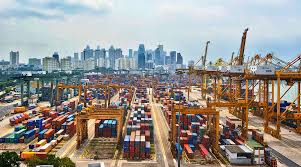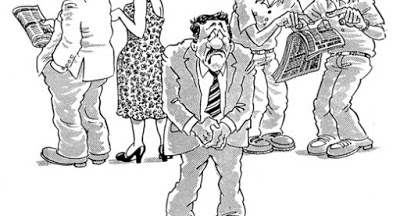
A Review Of The Maritime Sector In 2016 | Osinuga Damilola

The
year 2016 was indeed a very tough year for the Maritime Sector. There has not
been a more tumultuous year than the year 2016 for the maritime sector,
especially the container shipping sector. Even the infamous recession and
depression of the year 2008 fades in comparison to the challenges faced in the
maritime sector for the year 2016.
year 2016 was indeed a very tough year for the Maritime Sector. There has not
been a more tumultuous year than the year 2016 for the maritime sector,
especially the container shipping sector. Even the infamous recession and
depression of the year 2008 fades in comparison to the challenges faced in the
maritime sector for the year 2016.
The
year 2016 was quite unpredictable in relation to the shipping industry. There
were a lot of activities (both negative and positive) within the Top 10
Container Lines.
year 2016 was quite unpredictable in relation to the shipping industry. There
were a lot of activities (both negative and positive) within the Top 10
Container Lines.
It
has also been a year that has witnessed a lot of spectacular and unprecedented
events such as the collapse of Hanjin Shipping. This grabbed the headlines for
many reasons and caused momentary wide-spread panic in the container shipping
sector. It also increased speculation that other lines may suffer the same fate
and go bust. However, quite fortunately, the panic and speculation appears to
have settled with confidence regained in the sector.
has also been a year that has witnessed a lot of spectacular and unprecedented
events such as the collapse of Hanjin Shipping. This grabbed the headlines for
many reasons and caused momentary wide-spread panic in the container shipping
sector. It also increased speculation that other lines may suffer the same fate
and go bust. However, quite fortunately, the panic and speculation appears to
have settled with confidence regained in the sector.
2016
was also a year of consolidation. During the year in question, we witnessed
mergers of the following companies:
was also a year of consolidation. During the year in question, we witnessed
mergers of the following companies:
- The merger
of China Shipping Container Lines and Cosco Container Lines which is envisaged
will bring the total vessel to be owned by China Cosco Shipping Corporation
to Eight Hundred and Thirty-Two (832) vessels, almost three times those
owned by Maersk Line. - The merger
of Hapag-Lloyd AG (Hapag–Lloyd) and United Arab Shipping Company S.A.G.
(UASC). - The
announcement of an impending merger by three (3) major Japanese carriers –
Mitsui O.S.K. Lines (MOL), Nippon Yusen K.K. (NYK Line) and Kawasaki Kisen
Kaisha (“K”Line).
We
also witnessed the acquisition of:
also witnessed the acquisition of:
- CMA CGM
acquired Singapore-based Neptune Orient Lines, parent of APL; - Whilst
Maersk Line have also announced that it has reached an agreement to
acquire Hamburg Sud.
The
year 2016 also saw most shipping segments, except maybe for tankers bottoming
out, with historically low levels of freight rates and weak earnings. On the
one hand, the tanker market remained strong mainly due to the consistent drop
in oil prices. whereas on the other hand, in the container segment, there was a
steady decline in freight rates notwithstanding the short lived increase in
freight rates following the collapse of Hanjin Shipping.
year 2016 also saw most shipping segments, except maybe for tankers bottoming
out, with historically low levels of freight rates and weak earnings. On the
one hand, the tanker market remained strong mainly due to the consistent drop
in oil prices. whereas on the other hand, in the container segment, there was a
steady decline in freight rates notwithstanding the short lived increase in
freight rates following the collapse of Hanjin Shipping.
The
container market continues to struggle with weak demand due to many of the
behemoth container vessels coming in to the service throughout the year.
container market continues to struggle with weak demand due to many of the
behemoth container vessels coming in to the service throughout the year.
Measures
like idling, slow steaming, consolidation, restructuring of alliances,
integration etc have not slowed down the falling market.
like idling, slow steaming, consolidation, restructuring of alliances,
integration etc have not slowed down the falling market.
The
Nigerian Market
Nigerian Market
Just
like the international market, 2016 is a year stakeholders would want to forget
in a hurry.
like the international market, 2016 is a year stakeholders would want to forget
in a hurry.
The
year started off with the nagging foreign exchange crisis. All stakeholders
such as importers, shipping companies and other operators waited endlessly for
a lasting solution to be found with the inconsistency and unpredictability of
government policies being the order of the day.
year started off with the nagging foreign exchange crisis. All stakeholders
such as importers, shipping companies and other operators waited endlessly for
a lasting solution to be found with the inconsistency and unpredictability of
government policies being the order of the day.
The
industry also suffered as a result of the Central Bank of Nigeria (CBN)
directive in relation to the restriction placed in accessing the official
exchange for foreign currency for the importation of 41 identified items. Cargo
movement also dropped from about 6.3. million metric tonnes in January to about
5 million metric tonnes in November.
industry also suffered as a result of the Central Bank of Nigeria (CBN)
directive in relation to the restriction placed in accessing the official
exchange for foreign currency for the importation of 41 identified items. Cargo
movement also dropped from about 6.3. million metric tonnes in January to about
5 million metric tonnes in November.
There
has been loss in revenue as a result of the reduction in cargo volume. Many
experts have blamed this on anti-trade policies of the federal government. The
current hike in import duty is also not helping matters. It is estimated that
Nigerian ports have lost about 80 percent of their vehicle cargo as a result of
the import duty hike- this has done more harm than good.
has been loss in revenue as a result of the reduction in cargo volume. Many
experts have blamed this on anti-trade policies of the federal government. The
current hike in import duty is also not helping matters. It is estimated that
Nigerian ports have lost about 80 percent of their vehicle cargo as a result of
the import duty hike- this has done more harm than good.
The
maritime industry also witnessed some positive developments. The appointment of
Ms Hadiza Bala Usman as the Managing Director of the Nigerian Ports Authority
has brought some long needed reforms to the industry but her efforts has been
unable to totally change the long list of bad trade policies – we hope to see
more changes in 2016.
maritime industry also witnessed some positive developments. The appointment of
Ms Hadiza Bala Usman as the Managing Director of the Nigerian Ports Authority
has brought some long needed reforms to the industry but her efforts has been
unable to totally change the long list of bad trade policies – we hope to see
more changes in 2016.
2016
is a year every stakeholder in the world wants to forget as soon as possible.
With the economic prediction of 2017 not looking too favorable, stakeholders
can only be optimistic for a better year in 2017.
is a year every stakeholder in the world wants to forget as soon as possible.
With the economic prediction of 2017 not looking too favorable, stakeholders
can only be optimistic for a better year in 2017.
Damilola
Osinuga is an Associate in the Shipping and Oil Services practice group of Bloomfield
Law Practice, Nigeria
Osinuga is an Associate in the Shipping and Oil Services practice group of Bloomfield
Law Practice, Nigeria
Ed’s Note – This article was originally published here.
Photo Credit – www.mot.gov.sg




